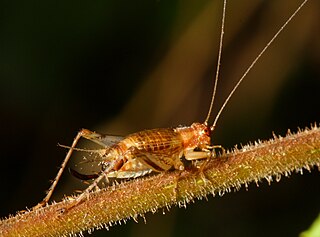 W
WAnaxipha is a genus of brown sword-tail cricket from tropical areas in the Americas, Africa, Asia, Australia and western Pacific islands.
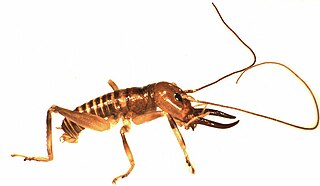 W
WThe Northland tusked wētā, Anisoura nicobarica, is a rare monotypic wētā of the family Anostostomatidae, endemic to the northern half of Northland in New Zealand, and originally described in 1932. The type specimen was wrongly labelled as coming from the Nicobar Islands, so the species was named Anisoura nicobarica. It was erroneously described again in 1950 by a different author, who placed it in the ground wētā genus Hemiandrus.
 W
WAnostostoma is the type genus of the family Anostostomatidae and consists of five species of insect, endemic to Australia.
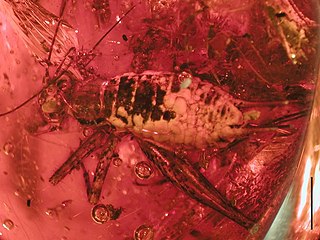 W
WAraneagryllus is an extinct monotypic genus of cricket in the subfamily Phalangopsinae with the sole species Araneagryllus dylani. The fossil was recovered in the Dominican Republic from early Miocene Burdigalian stage Dominican amber deposits on the island of Hispaniola. Araneagryllus is the first Phalangopsinae cricket to be described from the fossil record.
 W
WAtachycines is a genus of cave or camel crickets in the subfamily Aemodogryllinae; the genus has not been assigned to any tribe. Originating in Asia, species have been found in Borneo, the Indo-China region and Japan.
 W
WBarbitistes is a genus of bush crickets in the subfamily Phaneropterinae.
 W
WCamptonotus is a genus of leaf-rolling crickets in the subfamily Gryllacridinae. It includes the following species are all found in the Americas:Camptonotus affinis Rehn, 1903 Camptonotus americanus Bruner, 1915 Camptonotus australis Rehn, 1907 Camptonotus carolinensis (Gerstaecker, 1860) Camptonotus jamaicensis Brunner von Wattenwyl, 1888
 W
WCardiodactylus is an Asian genus of crickets in the family Gryllidae, subfamily Eneopterinae and tribe Lebinthini.
 W
WCeuthophilus is a genus of insects in the cave cricket family Rhaphidophoridae. It contains most of the species that are known commonly as camel crickets.
 W
WCooloola is a genus of ensiferan orthopterans known as Cooloola monsters. It is the only genus in the subfamily Cooloolinae and family Cooloolidae of the superfamily Stenopelmatoidea.
 W
WCycloptilum is a genus of common scaly crickets in the family Mogoplistidae. There are at least 50 described species in Cycloptilum.
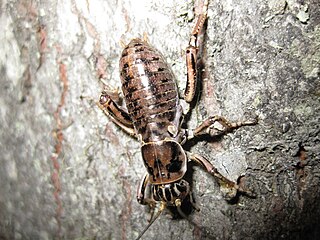 W
WHump-winged grigs are insects belonging to the North American genus Cyphoderris, in the family Prophalangopsidae, related to katydids.
 W
WGiant wētā are several species of wētā in the genus Deinacrida of the family Anostostomatidae. Giant wētā are endemic to New Zealand and all but one species are protected by law because they are considered at risk of extinction.
 W
WDiaphanogryllacris is a genus of Orthopterans, sometimes known as 'leaf-folding crickets' in the subfamily Hyperbaeninae and tribe Capnogryllacridini. The recorded distribution is: the Indian subcontinent, China, Indochina, western Malesia up to Sulawesi.
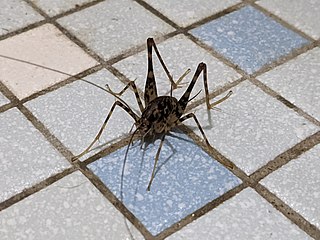 W
WDiestrammena is a 'camel' or 'cave-cricket' genus in the family Rhaphidophoridae. Species in the genus are native to Asia, including Japan.
 W
WDolichopoda is a genus of cave crickets in the tribe Dolichopodaini, subfamily Dolichopodainae. They are distributed in the Mediterranean basin in southern Europe and western Asia.
 W
WEumodicogryllus is a genus of crickets in the family Gryllidae and tribe Modicogryllini. Species in this genus are similar to - and were originally considered a subgenus of - Modicogryllus (Eumodicogryllus); they have been recorded from: Europe, northern Africa and temperate Asia.
 W
WGampsocleis is a genus of bush crickets in the subfamily Tettigoniinae and tribe Gampsocleidini.
 W
WGryllacris is a genus of Orthopterans, sometimes known as 'leaf-folding crickets' in the family Gryllacridinae. It is the type genus for the family, tribe Gryllacridini and its subfamily.
 W
WGryllodes is a genus of crickets in the family Gryllidae and tribe Gryllini. Species have been recorded in Australia, Asia, Africa (Ethiopia), central Europe, subtropical and tropical Americas.
 W
WGryllotalpa is a genus of insects in the mole cricket family Gryllotalpidae.
 W
WHadenoecus is a genus of common cave cricket of the southeastern United States and typical of the tribe Hadenoecini.
 W
WHemiandrus is a genus of wētā in the family Anostostomatidae. In New Zealand they are known as ground wētā due to their burrowing lifestyle. Hemiandrus wētā are nocturnal, and reside in these burrows during the day. Ground wētā seal the entrance of their burrow during the day with a soil plug or door so that their burrow is concealed. This genus was originally said to be distributed in Australia and New Zealand, however, with recent molecular genetic methods, this is under debate. Ground wētā adults are smaller than other types of wētā, with the unusual trait of having both long and short ovipositors, depending on the species. The name of this genus is said to come from this trait as hemi- mean half and -andrus means male, as the species where the female has a short ovipositor can sometimes be mistaken for a male. This genus has a diverse diet, depending on the species.
 W
WHomoeogryllus is a genus of cricket in the subfamily Cachoplistinae and tribe Homoeogryllini. The recorded distribution is: Africa and Peninsular Malaysia.
 W
WLarnaca is an Asian genus of Orthopterans, sometimes known as 'leaf-folding crickets', in the subfamily Gryllacridinae and tribe Gryllacridini. Species have been recorded from: southern China, Indochina and western Malesia.
 W
WAnostostomatidae is a family of insects in the order Orthoptera, widely distributed in the southern hemisphere. It is named Mimnermidae or Henicidae in some taxonomies, and common names include king crickets in South Africa and wētā in New Zealand. Prominent members include the Parktown prawn of South Africa, and the giant wētā of New Zealand. The distribution of this family reflects a common ancestry before the fragmenting of Gondwana.
 W
WMeloimorpha is a genus of cricket in the subfamily Cachoplistinae and tribe Homoeogryllini. The recorded distribution is: India, China, Korea, Japan and Vietnam.
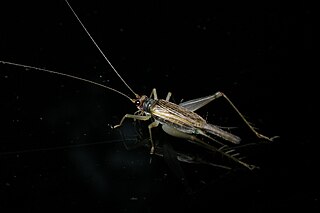 W
WMetiochodes is an Asian genus of "sword-tail crickets", in the subfamily Trigonidiinae and the tribe Trigonidiini.
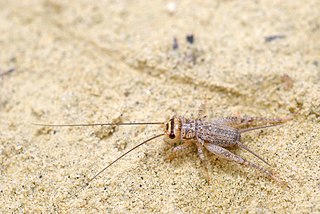 W
WModicogryllus is the type genus of crickets in the tribe Modicogryllini. Species have been recorded from: Europe, Africa, the middle East, temperate and tropical Asia through to Australia and western Pacific islands.
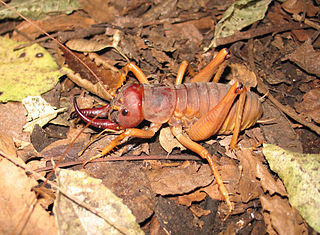 W
WMotuweta is a genus consisting of two species of tusked wētā in the family Anostostomatidae, endemic to New Zealand. The Northland tusked wētā, Anisoura nicobarica, may belong in this group, in which case the genus Motuweta would become a junior synonym of Anisoura.
 W
WMyrmecophilus or ant crickets, is a genus of orthopteran insects in the family Myrmecophilidae. This genus contains the majority of myrmecophilous (ant-loving) species in this small, obscure family.
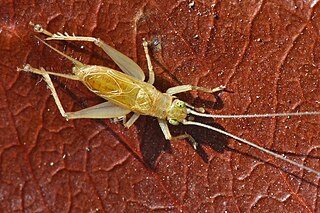 W
WNatula is a genus of sword-tail crickets in the tribe Trigonidiini.
 W
WNeonetus is a genus of cave wētā in the family Rhaphidophoridae, endemic to New Zealand. All described species are small; when adult, individuals are only about 1cm long. Neonetus variegatus and N. huttoni are common in native and exotic forests but because they are small and nocturnal they are often overlooked.
 W
WOecanthus is a genus of cricket in subfamily Oecanthinae, the tree crickets.
 W
WPachyrhamma is a genus of cave weta in the family Rhaphidophoridae, endemic to New Zealand.
 W
WPallidoplectron is a genus of cave wētā in the family Rhaphidophoridae, endemic to New Zealand.
 W
WParagryllacris is a genus of Orthopterans, sometimes known as 'leaf-folding crickets' in the family Gryllacridinae. It is typical for its tribe Paragryllacridini.
 W
WParaneonetus is a monotypic genus of wētā containing the species Paraneonetus multispinus, commonly known as the Three Kings cave wētā. P. multispinus is a cave wētā in the family Rhaphidophoridae, endemic to the Three Kings Islands of New Zealand.
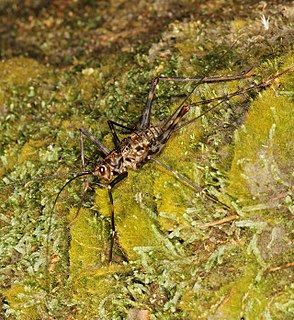 W
WPhalangacris is a genus of crickets in the family Phalangopsidae, tribe Phalangopsini, subtribe Heterogryllina. Both species are found in the Indian Ocean islands including the Seychelles.
 W
WPhonarellus is a genus of crickets in the family Gryllidae and tribe Gryllini. Species can be found in mainland Asia, Japan and tropical Africa.
 W
WPleioplectron is a genus of cave wētā in the family Rhaphidophoridae, endemic to New Zealand. These wētā are fairly common at night among the leaf litter in native forest in the South Island of New Zealand. The species look very similar to species of Miotopus, another New Zealand endemic genus, recently resurrected.
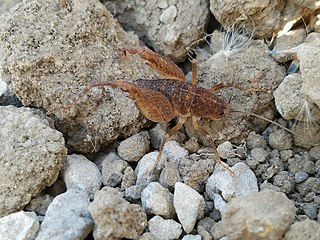 W
WPristoceuthophilus is a genus of insect in family Rhaphidophoridae named by James A. G. Rehn in 1903.
 W
WRoeseliana is a genus of bush cricket or katydid in the subfamily Tettigoniinae. Species in this genus were placed at various times in the genera Metrioptera and Bicolorana, until Roeseliana was restored in 2011.
 W
WScapteriscus is a genus of insects in the family Gryllotalpidae, the mole crickets. Members of the genus are called two-clawed mole crickets. They are native to South America. Some species have arrived in other regions, including parts of North America, where some have become invasive and have become established as pests.
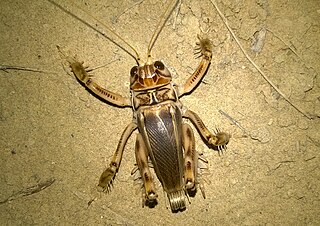 W
WSchizodactylidae is a family of orthopteran insects found in Asia and Africa, known as dune crickets or splay-footed crickets. They are usually found in desert and sandy areas. Species are predatory, including Schizodactylus inexspectatus. T. B. Fletcher notes that one captive individual did not feed on any vegetable matter.
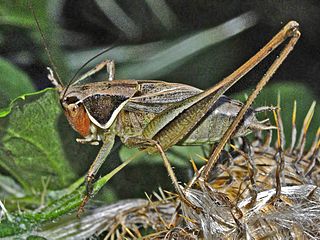 W
WSepiana sepium, common name sepia bush-cricket, is a species of bush crickets belonging to the subfamily Tettigoniinae and tribe Platycleidini. It is the only species within the monotypic genus Sepiana.
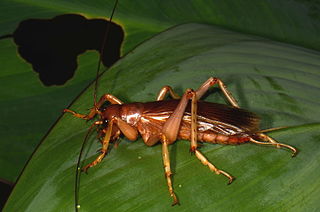 W
WSia is a genus of insect in the family Stenopelmatidae.
 W
WSvercus is a monospecific genus of crickets in the family Gryllidae and tribe Gryllini. According to available literature, it includes only one species, observed in Africa, in some Mediterranean countries and in southern Africa and Madagascar
 W
WTachycines is a genus of camel crickets in the subfamily Aemodogryllinae and tribe Aemodogryllini. Some authorities had placed the type species, T. asynamorus, in the genus Diestrammena, but recent papers returned this to the subgenus Tachycines (Tachycines), with a substantial number of new species recently described.
 W
WTarbinskiellus is a genus of crickets in the family Gryllidae and tribe Gryllini. Species can be found in Asia.
 W
WTessellana is a genus of bush crickets in the subfamily Tettigoniinae and genus group Platycleis. Species can be found throughout mainland Europe, the Middle East and North Africa.
 W
WTrigonidium is a large genus of sword-tail crickets, typical of the tribe Trigonidiini. Records of occurrence are from Europe, Africa, tropical Asia, Australia and the Pacific islands; many species endemic to Pacific islands including Hawaii have now been placed in the genus Nudilla.
 W
WTruljalia is a genus of crickets in the subfamily Podoscirtinae and tribe Podoscirtini. Species have been recorded in: India, southern China, Korea, Japan, Indo-China and west Malesia.
 W
WTurbottoplectron is a genus of cave wētā in the family Rhaphidophoridae, endemic to New Zealand.
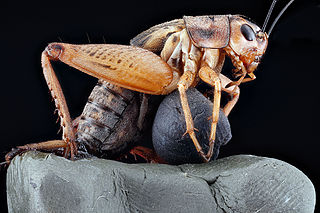 W
WVelarifictorus is a genus of crickets in the family Gryllidae and tribe Gryllini. Species have been recorded in Australia, Asia, Africa and the southeastern US.
 W
WIn 1923 Chopard described Weta, a genus of cave wētā in the family Rhaphidophoridae, endemic to New Zealand. In 2019 this genus was synonymised with the genus Pleioplectron